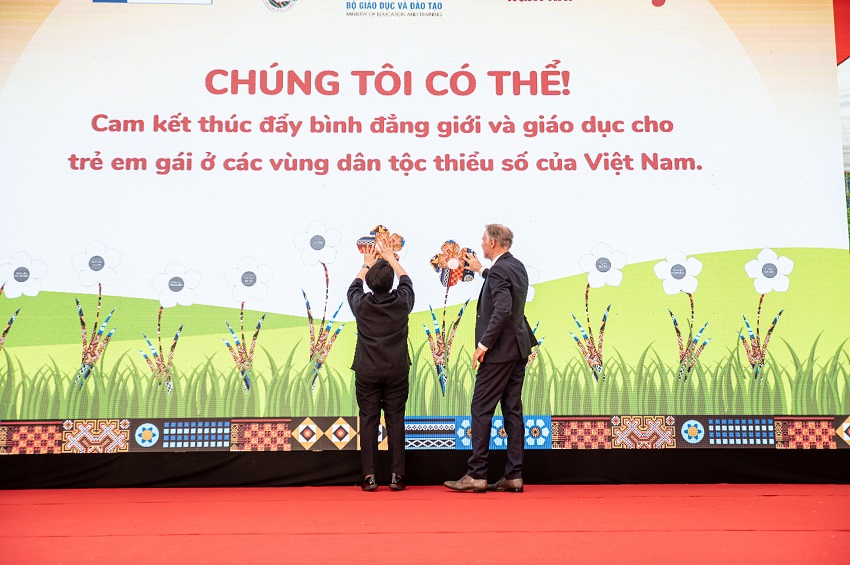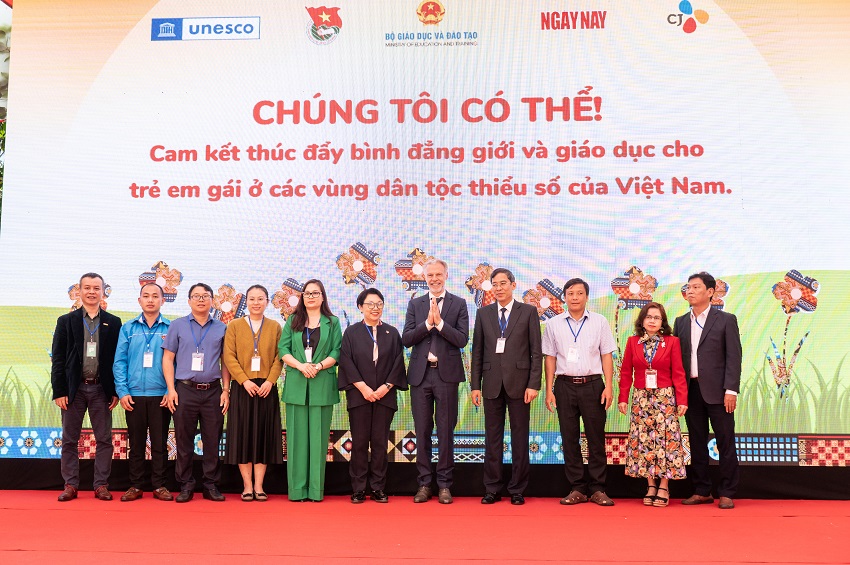UNESCO continues fund for gender equality project in Vietnam
The "We are ABLE" project aims to strengthen the ability of children from ethnic minorities, especially girls, to overcome the challenges they face.
The Ho Chi Minh Communist Youth Union on March 28 announced Phase II of the project "We are ABLE - Promoting Gender Equality and Girls' Education for Children in Ethnic Minority Areas of Viet Nam".
| The launching ceremony of UNESCO’s “We are ABLE” project occurred on March 28 in Hanoi. Photos: UNESCO Vietnam |
According to Christian Manhart, UNESCO Representative in Vietnam, the project is expected to contribute to the Vietnamese Government's new 10-year Strategic Plan for Education Development, the Strategy for Ethnic Minority Development, and the national commitment to achieving Sustainable Development Goals, especially Goal 4 on education and Goal 5 on gender equality.
In Vietnam, ethnic minorities are often disadvantaged compared to the majority population due to stereotypes and other cultural barriers. Ethnic minority children, especially girls, are more likely to drop out of school than other children, despite significant progress in universalizing basic education.
The UNESCO project "We are ABLE" has been launched to address this issue. The slogan "Achieving Better Living and Education", which stands for the acronym "ABLE", emphasizes confidence in the ability of ethnic minority children, especially girls, to overcome challenges.
Justine Sass, Chief of the Education for Inclusion and Gender Equality Section at UNESCO Headquarters in Paris, said that education can be a true source of empowerment when it addresses the gender-based barriers, stigma, and discrimination that prevent learners from fulfilling their right to education and future life, work and leadership opportunities.
"We must harness the power of education to unlock the potential of learners in all their diversity and transform educational institutions to achieve just, equal and inclusive societies," she said.
| Participants in the launching ceremony of UNESCO's project. |
Phase II of the "We are ABLE" project will be implemented in Cao Bang, Kon Tum and Ninh Thuan provinces to empower ethnic minority youth, especially girls and young women, in boarding secondary schools and neighboring communities to overcome stereotypes and express and act on their dreams, hopes, and aspirations in education.
It will build skills and platforms, create an enabling environment for student-led communication and advocacy, and strengthen the government's commitment to educating ethnic minority children and youth, especially girls.
Previously, Phase I of the We are ABLE project was jointly implemented by UNESCO, the Ministry of Education and Training (MoIT) and CEMA from 2019-2022, funded by the UNESCO Malala Fund for Girls' Right to Education with financial and technical support from CJ Group. It targeted 12 districts in three provinces: Ha Giang, Ninh Thuan and Soc Trang. The project increased ethnic minority girls' access to and retention in school and ensured better employment opportunities for ethnic minority women.
Phase I of the project reached 16,296 students (including 8,021 girls). In the 24 project schools, enrollment rates for ethnic minority students increased from 62% to 67%, dropout rates decreased from 3.8% to 2.9%, and transition rates to upper secondary education increased from 69.7% to 76.7%. More than 2,100 teachers and education administrators were trained in gender-responsive school counseling, and thousands more will be reached through the national rollout of the online course. And 120 ethnic minority women and youth were empowered through entrepreneurship training and continue to be supported by the Commune’s Women’s Union.
At the event, Mr. Vu Minh Duc, Director General of the Department of Teachers and Educational Administrators, MoET, called on the district offices of education and training in Cao Bang, Kon Tum, and Ninh Thuan to "strengthen cooperation and their responsibilities to cooperate with UNESCO in the implementation of the second phase of the project to achieve its goals as was done in the first phase".
The event, organized by the UNESCO Vietnam Office in cooperation with the Department of Teachers and Educational Administrators (DTEA) and MoIT, was attended by 100 delegates and thousands of livestream viewers.













